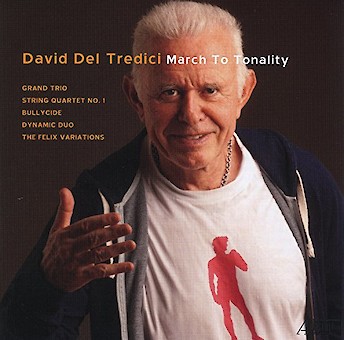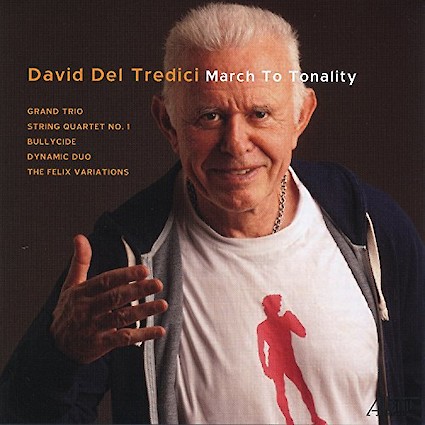Five World Premiere Recordings to be issued on Albany Records
10/2/2017
for piano sextet
It has been my mission in the last few years to create a body of musical compositions that unambiguously celebrate the gay experience—happy, sad, horrible, or bizarre. Works of mine such as Gay Life, S/M Ballade, Queer Hosannas, and Wondrous the Merge are examples. There have been times, too, when real-life events have served as inspiration. One such event was the brutal murder of Matthew Shepard in 1998. This shocked me as it did most people of feeling. At the same time, I sensed it was a moment for musical memorability. When I found the Jaime Manrique poem Matthew Shepard, a 10-minute song for baritone and piano was born.
Years later, real life touched me again. This time, it was the suicide of the young, gay violinist Tyler Clementi; his desperate response to the relentless bullying of schoolmates. When I mentioned this tragedy to Dennis Tobenski, a composer friend, he said, "But David, did you not know that, in the last six months, four other young, gay men have also committed suicide?" I did not. Then he named each of the other victims, as though they had been dear friends. I was stunned by this—not only by the fact itself, but by the intensity with which my young friend had spoken their names.
At that moment, an arrow seemed to pierce my own heart and I was flooded with painful memories of bullying in grammar and high school. I remembered that awful feeling of being treated as a "defective" person. I remembered the physical attacks bullies dished out to me in class whenever a teacher turned away—often in the form of spitballs lobbed at the back of my skull. And then I heard somewhere or read in the newspaper the word "bullycide." I thought the term perfectly encapsulated this new phenomenon: a teenager’s suicide due to bullying. With such stimulation, I could feel a new piece stirring and I set to composing, finding it unnecessary this time to wait for inspiration from a poet’s text.
Bullycide was composed in two chunks of time: from November 15, 2010 to February 1, 2011 and from October 14, 2012 to December 12, 2012. The first page of the score bears the inscription "Written in memory of 5 gay teens who committed suicide: Tyler Clementi, Billy Lucas, Asher Brown, Zack Harrington and Seth Walsh." The score is dedicated to my mate, Angellos Malefakis.
Bullycide is a piano sextet—that is, a string quartet plus piano and double bass. Schubert’s "Trout" Quintet, Op. 114 served as a model as it has the same instrumentation (minus one violin). Bullycide, in one continuous movement, is divided into two parts. The entire work lasts about 30 minutes.
A few words about the different sections of Bullycide:
Part I
Overture: The piece begins with solemn, yet passionate music in a dotted, march-like rhythm. The strings lead the way while the piano interjects. This music reappears at important junctures throughout the piece.
The Cadenza/Fantasy provides an opportunity for the pianist to be a virtuoso; beneath the many flourishes, a new theme is hinted at.
The Grand Fugue in 5 voices is a major point of arrival. The fresh theme, now fully formed, appears as the subject of the fugue. Why five voices? In my mind, each fugal entry represents one of the five lost youths. ("Things in Five" happen again and again in Bullycide.)
The Transition (in 5/8 time) leads to a grand pause.
Part II
The Names begins with some melodrama. The strings, playing a ghostly canon in a minor key version of the fugue theme, whisper the names of the five bullycide victims. At the end of each name is the added response "Gone!"
Strangled Voices: Lament and Rage: Throughout this section, the strings are severely muted—"strangled" as it were (using practice mutes). The Lament is lyrical and touching; the Rage, its violent opposite. But because of the "strangled" muting effect, this becomes an almost voiceless rage—a suffocating nightmare.
Dreams for the 5: This section is a potpourri of imagined feelings the five youths might have had if they’d lived. The hyper-romantic opening section leads to the heroic, to the energetic, to the whimsical, and finally to the grandiose, the climax of which is cut short—like their young lives.
In Peace: I end the work with an evocation of that last stage of loss following resignation and acceptance: peace. The music, utterly calm now, winds its way through many different keys. Familiar themes are fleetingly heard, and one last time, the music rises to a climax.
A postscript follows—my quotation (and development) of the "Trout" theme from Schubert’s Piano Quintet in A major, Op. 114. Why end with a humorous, smiling gesture after all the Sturm und Drang? It is my way of saying that—against all odds, absurdly—life does go on!
March to Tonality presents a David Del Tredici with whom listeners may be less familiar. Rather than the action-packed vocal and large ensemble music that is his calling card, this collection of chamber works, all recorded for the first time, showcase Del Tredici’s dense, dramatic writing for chamber forces.
The double-album opens with Del Tredici’s Grand Trio. The rippling energy of the opening figure from pianist Steven Beck sets the pace for the first three movements, which are all played attacca. Throughout this thirty minute climb, Del Tredici recontextualizes several familiar musical fixtures in their synthesis. As the work unfolds, moments reminiscent of Mozart, Mahler, and Mingus flow together elegantly, building towards the dramatic climax of the work, which (of course) is a fugue. The work closes with its shortest movement, Reminiscence – Allegretto amabile. Aptly titled, this movement looks back on the the rest of the work with a nostalgic, rose-tinted filter.
String Quartet No. 1 occupies the final three tracks of the first album. Innocence and Experiencecontain many tender moments, but the heart of this work is in the third movement, Grosse Tarantelle. This final third moment is nearly twice as long as the first two movements combined, and sustains the ecstatic energy of the opening throughout the entire movement. Even as the music slows later in the movement, one still hears vestiges of the opening figure rippling through the ensemble.
The tragic story of teen suicides inspires another of the pieces. Exactly halfway through Bullycide, the names of five young people who took their lives due to bullying are whispered. Again, in another work, an overtly emotional moment like this might betray the material that both precedes and follows it, but both Del Tredici’s pacing and the intimacy of the ensemble’s playing allow this to be the piece’s highpoint.
Not to be overlooked in the midst of the other, significantly larger, pieces on this double album, the chemistry of violinist Mark Peskanov and bass trombonist Felix Del Tredici brings this unusual combination together seamlessly in Dynamic Duo. While the Batman reference is (presumably) unintentional, it is still somewhat apt. In Del Tredici’s Dynamic Duo, the bass trombone is a clear leader, outfitted with equipment and skills to boot. Del Tredici presents a broad spectrum of possibility for this instrument through mutes and extended techniques, including singing through the instrument to create a haunting, metallic echo of the human voice.The final track, The Felix Variations, showcases Felix Del Tredici in a solo format. Initially unsure what else the bass trombone had to offer, each variation seemed to scold my lack of imagination, presenting a rich palette of colors and textures while never compromising expression for effect.
Grand, never gauche, and cunning without camp, Del Tredici toes a fine line in embracing a postmodern aesthetic without the emotional separation of irony. The constant rise in dramatic tension across the first half-hour of the Grand Trio, the disproportionate length of the finale of String Quartet No. 1, and the use of a myriad extended techniques in Dynamic Duo and The Felix Variations all prove powerfully expressive. March to Tonality is a longer play, but didn’t out stay its welcome.
Also neo-Classical, Del Tredici's "Bullycide" proved even more life-affirming. But what made the piece special was that both those qualities seemed at first encounter counterintuitive.
The composer's inspiration was a sequence of suicides by gay teenagers who had been bullied. Perhaps Del Tredici had hoped to curb painful memories of his own experiences with bullying as a teen (which he described in his program note) by choosing a classical model, Schubert's "Trout Quintet," as his starting place. But as a composer of gloriously over-the-top pieces based on "Alice in Wonderland," Del Tredici has never been one for holding back.
And there was simply no stopping Del Tredici in "Bullycide." He needed at least one more instrument than Schubert, so he added violin along with the string, bass and piano. He begins the piece with a hook, a thrillingly good tune and writes as though he can't bring himself to let go of it. A fugue that follows sets the pulse racing.
A litany of names of the dead teens, read by the musicians in ghostly voice, is ghoulish but somehow deeply sweet. Rage is released by overplaying on muted strings in a section titled "Strangled Voices." But Del Tredici refuses to take off his glitter while mourning, as if the way to wound the bullies were to dazzle and daze them with bright light. It is a brilliantly effective score, and it got an exuberant performance from the Shanghai Quartet, pianist Orion Weiss and bassist DaXun Zhang.


